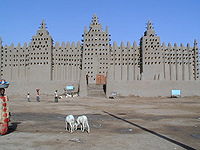
Religion in Mali
Encyclopedia

Muslim
A Muslim, also spelled Moslem, is an adherent of Islam, a monotheistic, Abrahamic religion based on the Quran, which Muslims consider the verbatim word of God as revealed to prophet Muhammad. "Muslim" is the Arabic term for "submitter" .Muslims believe that God is one and incomparable...
, mostly Sunni or Sufi; Approximately 5 percent are Christian (about two-thirds Roman Catholic and one-third Protestant denominations); The remaining 5 percent of Malians adhere to indigenous or traditional animist beliefs. Atheism
Atheism
Atheism is, in a broad sense, the rejection of belief in the existence of deities. In a narrower sense, atheism is specifically the position that there are no deities...
and agnosticism
Agnosticism
Agnosticism is the view that the truth value of certain claims—especially claims about the existence or non-existence of any deity, but also other religious and metaphysical claims—is unknown or unknowable....
are believed to be rare among Malians, most of whom practice their religion on a daily basis, although some are Deist.
According to the U.S. Department of State’s annual report on religious freedom, Islam as traditionally practiced in Mali can be characterized as moderate, tolerant, and adapted to local conditions. Women participate in economic, social, and political activity and generally do not wear veils. The constitution establishes a secular state
Secular state
A secular state is a concept of secularism, whereby a state or country purports to be officially neutral in matters of religion, supporting neither religion nor irreligion. A secular state also claims to treat all its citizens equally regardless of religion, and claims to avoid preferential...
and provides for freedom of religion
Freedom of religion
Freedom of religion is a principle that supports the freedom of an individual or community, in public or private, to manifest religion or belief in teaching, practice, worship, and observance; the concept is generally recognized also to include the freedom to change religion or not to follow any...
, and the government largely respects this right. Relations between Muslims and practitioners of minority religious faiths are generally amicable, and foreign missionary groups (both Muslim and non-Muslim) are tolerated.

